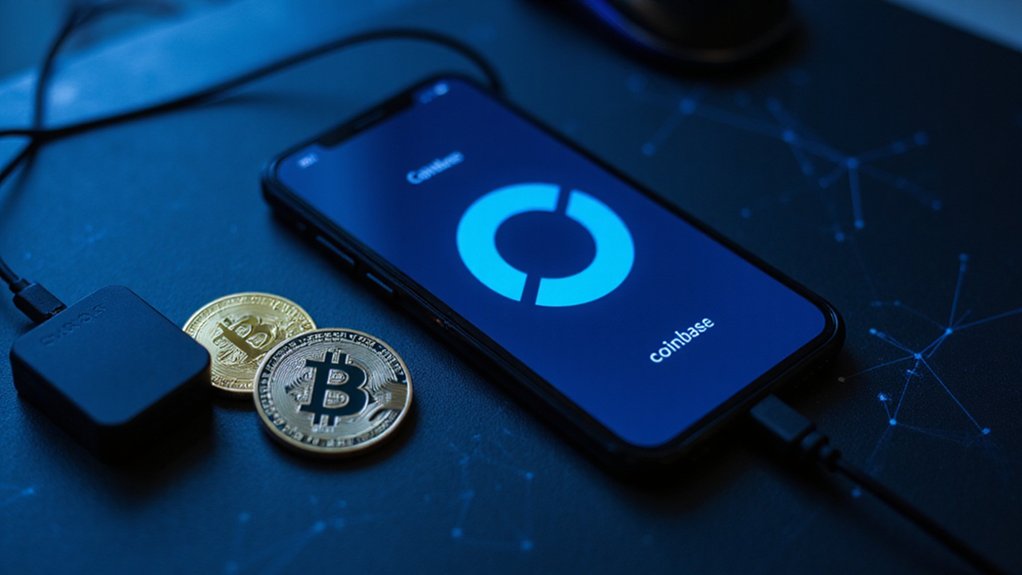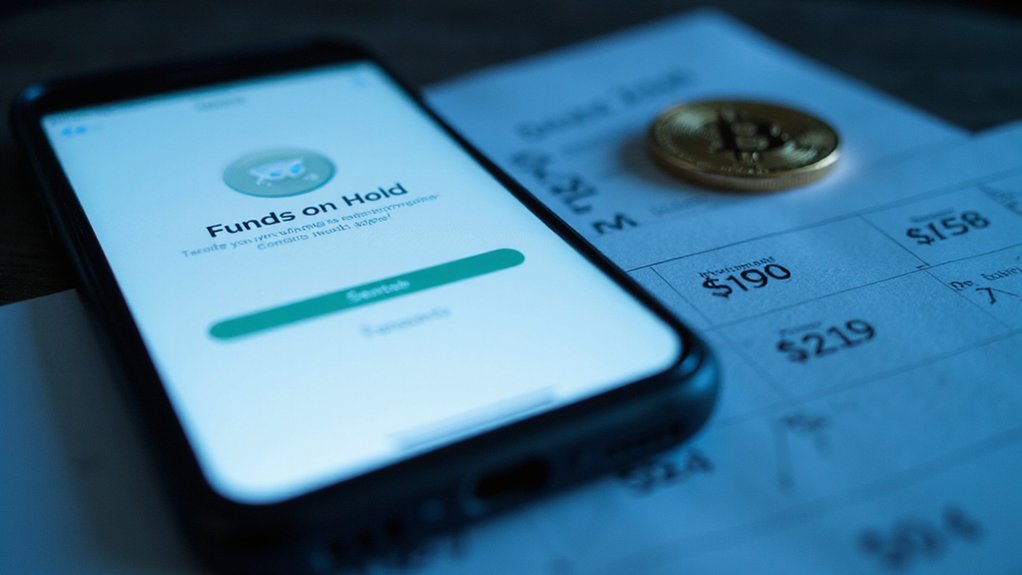Coinbase Wallet is a self-custody cryptocurrency solution entirely distinct from the company’s exchange platform. Unlike Coinbase.com, this standalone application stores private keys locally on users’ devices—not corporate servers—granting complete control over digital assets. It supports multiple blockchains (Bitcoin, Ethereum, Solana) and thousands of tokens while providing biometric authentication and seed phrase recovery options. The interface serves as a portal to decentralized finance, allowing users to swap tokens and interact with dApps. Further exploration reveals a fascinating tension between institutional pedigree and decentralized principles.

A Coinbase Wallet represents the crypto industry’s shift toward user sovereignty—a self-custody digital repository that places the proverbial keys to one’s financial kingdom directly in users’ hands rather than institutional vaults.
Unlike its namesake exchange platform Coinbase.com (with which it is often conflated), this standalone application stores private keys locally on the user’s device, not in some nebulous corporate server farm where they remain vulnerable to the whims of regulatory caprice or security breaches.
Private keys reside on your device, not in vulnerable corporate servers subject to regulatory whims or security compromises.
The wallet boasts compatibility with an impressive array of digital assets—Bitcoin, Ethereum, Solana, and thousands of ERC-20 tokens among them—across multiple blockchain networks including Polygon and Avalanche.
This multi-chain functionality enables users to manage disparate cryptocurrencies and NFTs within a single interface, eliminating the digital equivalent of stuffing various financial instruments into different mattresses throughout one’s home.
Security features mirror what one might expect from contemporary financial technology: biometric authentication, two-factor verification, and seed phrase backups (those maddening yet indispensable 12-word sequences that simultaneously represent crypto’s greatest security innovation and its most significant user experience challenge).
The application’s user-friendly design caters to both crypto neophytes and blockchain veterans with surprisingly intuitive navigation. Users can take advantage of layers of security that provide additional protection for their digital assets on all devices.
Beyond mere storage, Coinbase Wallet functions as a portal to the decentralized finance ecosystem, facilitating token swaps, dApp interactions, and even direct cryptocurrency purchases using conventional payment methods.
Available in over 120 countries, the platform supports bank transfers, credit cards, and various local payment options, effectively democratizing access to digital asset acquisition.
Accessible as both a mobile application and Chrome extension, Coinbase Wallet exemplifies the industry’s evolution toward user empowerment without sacrificing convenience. It differs from the standard Coinbase app because it gives users complete control over their private keys, which are essential for proving ownership of cryptocurrency.
For those seeking an entry point to cryptocurrency ownership that eschews traditional custodial arrangements while maintaining operational simplicity, Coinbase Wallet offers a compelling compromise—institutional pedigree with decentralized principles, wrapped in an interface that doesn’t require a computer science degree to navigate.
Unlike the main Coinbase platform which offers exchange insurance for certain assets, Coinbase Wallet shifts full responsibility for security to the individual user.
Frequently Asked Questions
How Do I Recover My Coinbase Wallet if I Lose My Phone?
To recover a Coinbase Wallet after losing a phone, users can employ several methods depending on their setup.
Those with standard wallets must input their recovery phrase on a new device—hopefully backed up somewhere secure (the financial equivalent of hiding emergency cash in one’s freezer).
Smart Wallet users can utilize their recovery key, though this incurs network fees.
Cloud-based passkey methods offer the most straightforward recovery, assuming one’s iCloud or Google Drive credentials remain accessible.
Can I Use Coinbase Wallet in Countries Where Coinbase Is Unavailable?
Yes, Coinbase Wallet remains functional in regions where the Coinbase exchange is unavailable.
As a self-custody solution where users control their private keys locally, this decentralized wallet operates independently from Coinbase’s centralized platform.
Users can still access DeFi protocols, trade NFTs, and manage cryptocurrencies onchain—though payment method availability for purchasing crypto may vary by location.
The wallet’s peer-to-peer functionality persists regardless of Coinbase’s regional restrictions, offering a backdoor to blockchain participation where exchange services are prohibited.
What Are the Transaction Fees for Coinbase Wallet Transfers?
Coinbase Wallet’s fee structure exhibits typical blockchain economics—network fees apply when transferring crypto off-platform (estimated at transaction time but subject to batching efficiencies), while Lightning Network bitcoin transfers incur a modest 0.1% processing fee.
Internal transfers between Coinbase users’ primary balances mercifully incur no platform fees.
The traditional buy/sell spread functions as an implicit fee—though Advanced trading sidesteps this particular cost.
Payment method fees vary considerably; ACH transfers remain free while debit purchases command a hefty 3.99%.
Is Coinbase Wallet Compatible With Hardware Wallets Like Ledger?
Yes, Coinbase Wallet is compatible with hardware wallets like Ledger.
Users can integrate their Ledger devices with Coinbase Wallet using the wallet’s recovery phrase—a process that enhances security by keeping private keys offline while maintaining access to assets.
This integration works across Coinbase Wallet’s browser extension and supports a wide range of cryptocurrencies on various networks including Ethereum, Solana, and other EVM-compatible chains.
The self-custody nature of both platforms guarantees users retain control of their assets.
Can I Stake Crypto Directly Through My Coinbase Wallet?
Yes, users can stake cryptocurrencies directly through Coinbase Wallet.
The platform’s Shared ETH Staking feature significantly eliminates the traditional 32 ETH minimum requirement, allowing investors to stake any amount of Ethereum they possess.
This democratization of staking (a rather innovative departure from crypto’s occasional elitism) operates via Coinbase’s validator infrastructure.
While staking options exist, users should remain mindful of waiting periods and cooldown requirements that inevitably accompany the unstaking process.









